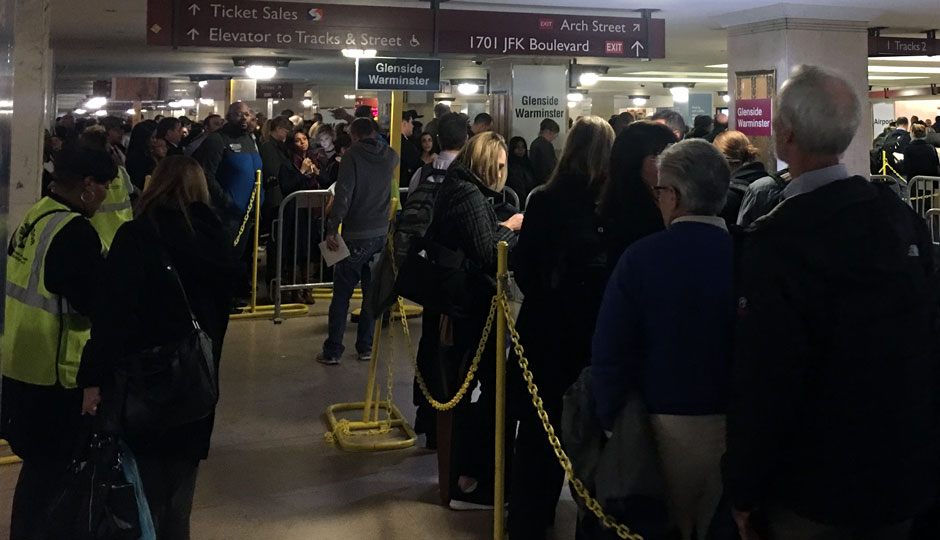7 Takeaways From the SEPTA Strike
A look at the strike's winners and losers, and what's likely to follow.

SEPTA commuters wait in line during the evening rush hour at Suburban Station on November 4, 2016. | Photo: Dan McQuade
Now that we can all go back to getting around the city on SEPTA the way we usually do, it’s time to sift through the weeklong drama that was Transport Workers Union Local 234 strike and see what revelations we can uncover.
- The TWU outclassed SEPTA in the PR battle. Even though Willie Brown’s decision to take his union’s members out one week before a major national election threw both SEPTA management and the city’s political class into a panic on top of inconveniencing hundreds of thousands of riders, he laid the groundwork for his action quite well by avoiding the overheated rhetoric of his predecessor and calmly laying out the union’s position on both the major issues and the slow pace of talks before the strike. SEPTA board chair Pat Deon’s response on the Wednesday of the strike was a valiant effort to regain the upper hand, but it was too little, too late.
- Despite its troubles, Regional Rail turned out to be a decent backup. After a day of pure commuting hell on Tuesday, the Regional Rail system got back to something close to normal for the rest of the strike, moving a larger-than-usual number of city residents to and from work, on top of the usual crowd. Special fare-collection and queuing procedures SEPTA implemented helped keep overcrowding down, though they did mean long lines of waiting passengers at the evening rush in Center City.
- The strike proved that Philadelphians aren’t as bad as Philadelphians say they are. Stories of individual citizens and organizations arranging shuttles and rides for people who would miss work or appointments because of the strike showed that our civic consciousness and community spirit remain strong. Some businesses also pitched in: Zipcar, for instance, offered — and is still offering — free cars from 6 to 10 p.m. tomorrow so voters can make it to the polls on time.
- Ride-sharing proved itself as a transit alternative and supplement. Although there were reports of much-higher-than-usual fares, Uber and Lyft — now legal for good in Philadelphia — helped keep traffic in the city from becoming even more nightmarish as riders turned to the services to get around or to and from Regional Rail. Uber used the strike to expand its carpool service throughout the SEPTA service territory, building on its successful partnership that offered first- and last-mile service to Regional Rail stations over the summer.
- There will be a fare hike, but it won’t be because of this contract – at least not primarily. Deon said as much at the early-morning news conference announcing the tentative agreement. The reason why this is the case: This was the year when SEPTA was supposed to implement one of its regularly scheduled fare hikes under the terms of Act 44, the state law that was supposed to have fixed the state’s transportation funding crisis but didn’t. SEPTA held off on implementing the hike because it didn’t want to confuse or upset riders as it finally rolled out the new SEPTA Key fare payment technology. If this strike has any impact on that fare hike, it will be in its size. Again, we won’t know for sure whether that’s the case until the details of the contract emerge.
- Next time, management should come to the table sooner. One of the main complaints the TWU had about this round of contract talks was that SEPTA management made no effort to launch actual bargaining ahead of the looming deadline. As no evidence negating this complaint came out during the run-up to the strike or the strike itself, I at least have to consider that complaint valid. Given that the contract that expired had left some of the thornier issues that led the union to walk this time unresolved, it would have been better all around if the efforts to resolve them had begun in the summer, when the union presented its list of demands.
- There will be some attempt to make this the last SEPTA strike. Some transit advocates, noting that SEPTA’s labor relations history has been no better than that of the private company it replaced, are arguing that it’s time to change the law so that one of the original reasons the agency was created in 1964 — namely, to change that history — can be realized. But don’t expect to see the reform most frequently called for so far — a Pennsylvania version of New York State’s Taylor Law — to become reality. For one thing, even with a Republican legislature in Harrisburg, there remains little appetite to pass laws in this state perceived as punishing unions for doing what they’re supposed to do; for another, a Taylor-like law would contain a provision SEPTA management remains opposed to, namely, imposing binding arbitration in a contract dispute in exchange for the union giving up the right to strike. But that doesn’t mean rider advocates might not try other means to avoid pissing off the riding public when the next contract dispute comes around.
Follow Sandy Smith on Twitter.


